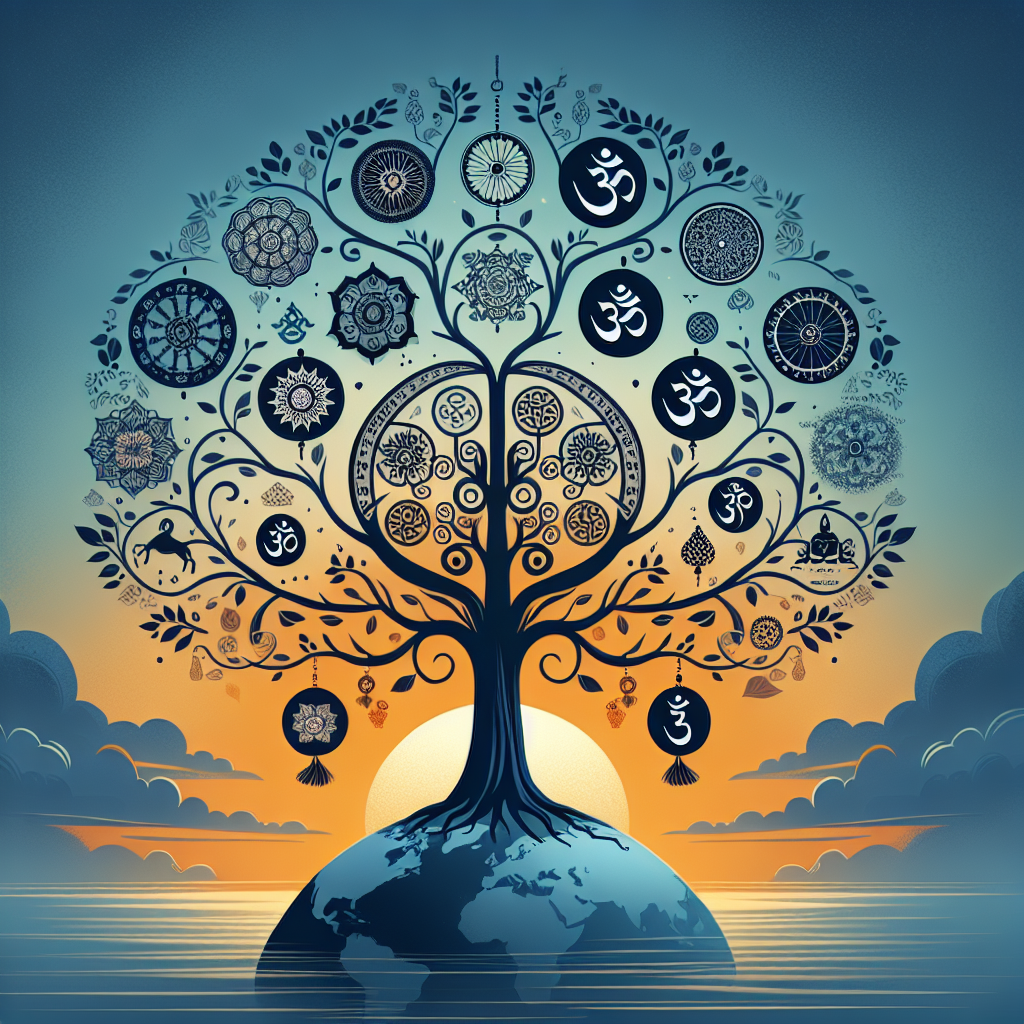Karma is a concept that transcends individual cultures, beliefs, and practices, deeply woven into the spiritual tapestry of several religions, most notably Hinduism and Buddhism. Originating from ancient Indian philosophy, the idea of karma has evolved and traveled across various cultures, influencing thoughts about morality, destiny, and the human experience. This article delves into the core tenets of karma as perceived in Hinduism and Buddhism while also exploring its resonance in different cultures around the world.
The Concept of Karma in Hinduism
Karma, derived from the Sanskrit word "karmā," meaning "action," is central to Hindu philosophy. In Hinduism, karma encompasses the principle of cause and effect, where every action—whether physical, verbal, or mental—has consequences. These consequences can manifest in the present life or future existences, shaping one’s circumstances, behavior, and life experiences.
Karma and Reincarnation
In Hinduism, the doctrine of reincarnation is closely tied to karma. The soul is believed to undergo a cycle of birth, death, and rebirth (samsara), influenced by the cumulative karma from past actions. Good deeds, or "punya," accumulate positive karma, paving the way for a favorable rebirth, whereas bad deeds, or "papa," lead to negative karma and potentially unfavorable reincarnations. This cyclical journey encourages individuals to act righteously, fostering a sense of moral responsibility.
Types of Karma
Hindu philosophy further categorizes karma into three types:
- Sanchita Karma: The total accumulated karma from all past lives, both good and bad.
- Prarabdha Karma: The portion of sanchita karma that is ripening in the current life, influencing the present circumstances.
- Kriyamana Karma: The karma being created in the present moment, which will affect future lives.
Each type emphasizes the dynamic interplay between actions and consequences, urging adherents to live with ethical consideration.
Karma in Buddhism
Buddhism also embraces the concept of karma, although its interpretation differs slightly from that in Hinduism. It is essential to note that while Buddhism shares roots with Hinduism, it developed its distinct philosophical framework.
The Four Noble Truths
At the heart of Buddhism is the Four Noble Truths, which illustrate the nature of suffering and the path to liberation. Karma plays a crucial role in this context, highlighting how actions contribute to suffering and the cycle of samsara.
The Law of Karma
In Buddhism, karma is understood as a natural law akin to gravity—actions lead to reactions. The emphasis is not just on the actions themselves but also on the intentions behind them. Positive intentions lead to beneficial results, while negative intentions result in suffering. This highlights the ethical dimension of karma, encouraging followers to cultivate wholesome thoughts and actions.
Karmic Consequences
Buddhism does not affirm a self or soul that transmigrates from one life to another; rather, it views the continuity of consciousness as influenced by karma. As individuals engage in ethical practices and strive for enlightenment, they accrue positive karma, which can lead to better rebirths or, ultimately, liberation from the cycle of samsara (nirvana).
Karma in Other Cultural Contexts
Though often associated with Eastern religions, the concept of karma has made its mark in various cultures and belief systems globally.
Cyclical Ideologies in Indigenous Cultures
Many indigenous cultures share concepts similar to karma, emphasizing the interconnectedness of actions and their effects on nature and community. The belief that one’s actions towards nature and society will shape future circumstances is prevalent in many tribal philosophies. Reciprocity, balance, and the importance of community well-being reflect shared values across various indigenous belief systems.
Western Interpretations
In modern Western contexts, the term ‘karma’ is often used colloquially to refer to the idea of ‘what goes around comes around.’ While less formalized than the spiritual understandings in Hinduism or Buddhism, this belief emphasizes moral accountability and the expectation of justice. Such interpretations may distance the term from its traditional context but highlight a universal yearning for fairness and consequence.
New Age Movements
Various New Age movements have embraced and sometimes appropriated the concept of karma, merging it with individualistic spiritual practices. Here, karma is often presented as a tool for self-improvement and personal growth, aligning with the broader themes of manifestation and positive thinking popular within these communities.
The Role of Karma in Contemporary Society
Today, karma serves both philosophical and practical roles in society. People from diverse backgrounds refer to karma to promote ethical living, motivating actions and decisions based on the belief in inevitable consequences.
Ethical Considerations
Karma-inspired ethical frameworks help guide moral decision-making in increasingly complex social scenarios. Many modern individuals apply karmic principles to issues like social justice, environmentalism, and personal relationships, striving for actions that foster harmony and well-being.
Personal Responsibility
Karma’s teachings also cultivate a sense of personal responsibility, encouraging individuals to take ownership of their actions. This self-awareness can lead to healthier choices, more compassionate interactions, and a community engagement rooted in the desire for mutual upliftment.
Conclusion
Karma, a profound and complex concept, resonates across cultures, especially within Hinduism and Buddhism. While interpretations may vary, the principles of cause and effect, ethical responsibility, and interconnectedness remain constant. As humanity grapples with the consequences of its actions on a personal and global scale, understanding the various dimensions of karma can inspire a more conscientious and harmonious way of living.
FAQs
1. What is the origin of the term ‘karma’?
Karma originates from the Sanskrit word "karmā," meaning "action" or "deed." It is derived from ancient Indian philosophical texts, particularly within Hinduism and Buddhism.
2. How is karma different in Hinduism and Buddhism?
While both religions embrace the concept of karma, Hinduism focuses on the cumulative karma affecting the cycle of reincarnation, while Buddhism emphasizes the intention behind actions and its relation to suffering and enlightenment.
3. Can karma be changed or influenced?
Yes, karma can be changed through conscious actions. Individuals can create positive karma by engaging in good deeds, practicing compassion, and cultivating positive intentions.
4. Is karma a form of punishment?
Karma is not a punitive measure but rather a natural law of cause and effect. It’s a way to understand the consequences of actions rather than an external punishment from a deity.
5. How does karma relate to modern ethical practices?
The principles of karma can guide contemporary ethical considerations, encouraging individuals to take responsibility for their actions and make choices that promote well-being and social justice.
It seems like you’re looking for a prompt, but you haven’t specified what kind of prompt you need. Could you please provide more details or context? For example, are you looking for a writing prompt, a creative project idea, a question to stimulate discussion, or something else entirely? Let me know how I can help!, #Karma #Cultures #Understanding #Role #Hinduism #Buddhism, #Karma #Cultures #Understanding #Role #Hinduism #Buddhism, 1735088996, karma-across-cultures-understanding-its-role-in-hinduism-buddhism-and-beyond





